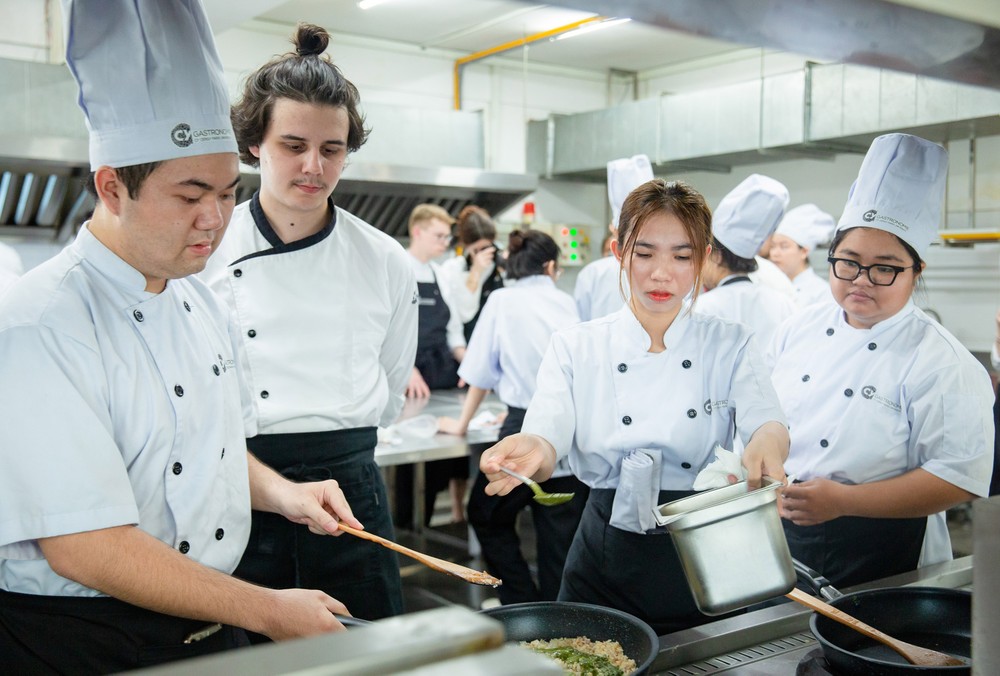
Enrolment quotas of international training joint programs have necessitated additional recruitment efforts though the admission scores for these programs are lower than those for domestic courses.
Ho Chi Minh City University of Industry in partnership with Angelo State University (ASU) in the United States offers a 2 + 2 program, where students spend the first two years in Vietnam and the subsequent two years in the U.S.. Students of the program will receive degrees issued by ASU.
Currently, there are eight programs available for enrollment in Vietnam, including Business Administration, Marketing, International Business, Finance and Banking, Accounting, English Language, Computer Science, and Natural Resources and Environmental Management. However, since 2022, the enrollment situation has been challenging; in 2023, the university managed to enroll just over ten candidates, leading to the decision to cease enrollment for 2024.
In 2024, Ho Chi Minh City Open University has 13 international training joint programs with two universities in Australia and one university in France, but just a few dozen candidates registered for the school’s international training joint program. The school has stopped enrollment in the International Trade program in association with Rouen University - France.
In particular, joint programs with Australian universities continue to consider additional enrollment despite the school's lowest admission score (16 points). The school said that the enrollment situation in 2024 continues to be difficult.
Similarly, Ho Chi Minh City Open University has established 13 international training joint programs with two Australian universities and one French university. However, it has only attracted a few dozen candidates, resulting in the discontinuation of the International Trade program in collaboration with Rouen University in France.
Notably, the joint programs with Australian institutions are still considering additional recruitment, even though the admission score remains at a low 16 points. The university has indicated that the enrollment challenges are expected to persist into 2024.
Likewise, Nguyen Tat Thanh University is facing challenges in attracting students to its joint programs with institutions in the UK, US, Australia, and Japan. In 2023, many of these programs managed to enroll only a handful of students.
Meanwhile, the International University (part of Ho Chi Minh City National University) offers nearly 30 joint programs in various formats, including 2+2 (two years in Vietnam followed by two years abroad), 3+1 (three years in Vietnam and one year abroad), and 4+0 (entirely on-site). Depending on the specific program, students typically spend 2-3 years in Vietnam before transferring to partner universities in the UK, US, Australia, and New Zealand to complete their studies and earn a degree from a joint institution ranked among the top 30 in the UK and US.
However, since 2022, despite having nearly 1,500 spots available for international joint programs each year, the university has consistently failed to fill even 50 percent of these positions.
Many member schools of Hanoi National University, Foreign Trade University, Duy Tan University, Ho Chi Minh City University of Economics and Finance, Ho Chi Minh City University of Industry and Trade show that the enrollment situation for many international joint training programs is also facing difficulties, not a single year has met the enrollment quota, some majors have had to stop enrollment.
According to statistics from the Ministry of Education and Training, as of June 2024, the whole country has 62 higher education institutions having 369 joint training programs with foreign countries. Of which, there are 285 programs at the university level, 74 programs at the master's level and 10 programs at the doctoral level.
Of the 369 programs, ranked by country, the UK has 120 programs, Australia has 40, the United States has 34, Germany has 28, France has 26, Korea has 21 and Taiwan (China) has 14, the remaining 86 programs are from other countries. Business, finance, accounting, administration, and management majors account for 50 percent while the science and technology major, the social sciences and humanities major, and other majors such as medicine, pharmacy, and law account for 50 percent.
The Department of Higher Education under the Ministry of Education and Training reports that Vietnam currently offers a variety of international training programs and those entries for international joint academic programs are require to master English - the mandatory language.
However, there are no established guidelines for enrollment and training organization across all levels in collaboration with foreign institutions. This lack of direction has resulted in 62.71 percent of programs involving foreign universities not being assessed or ranked for quality. Consequently, there are constraints on the quality of incoming students, particularly regarding their foreign language skills, academic performance, and relatively low scores on high school entrance examinations.
Head Nguyen Trung Nhan of the Training Department at Ho Chi Minh City University of Industry highlighted additional challenges faced by training units beyond those identified by the Ministry of Education and Training. He noted that the tuition fees for international joint programs are currently more than double those of domestic programs. A student opting for study abroad options, such as the 2+2 or 3+1 programs, must pay tuition fees which are as much as 4.5 times higher, with some institutions charging up to ten times the cost of studying in Vietnam.
Furthermore, the requirement for proficiency in English poses a significant barrier for many learners. Representatives from various universities also expressed concern regarding a troubling aspect of the Law on Higher Education 2018.
According to Clause 7, Article 45, higher education institutions are mandated to accredit joint programs in Vietnam immediately after student graduation and follow a prescribed accreditation cycle. However, many programs currently lack adequate facilities and qualified lecturers.
Quality of some international joint academic programs is even worse than certain domestic programs.
























